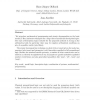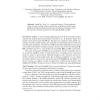11 search results - page 2 / 3 » Number Restrictions on Complex Roles in Description Logics: ... |
LPAR
1999
Springer
13 years 9 months ago
1999
Springer
Abstract. Description Logics (DLs) are a family of knowledge representation formalisms mainly characterised by constructors to build complex concepts and roles from atomic ones. Ex...
AI
1999
Springer
13 years 4 months ago
1999
Springer
Forthcoming in the Journal of Aritificial Intelligence We introduce mathematical programming and atomic decomposition as the basic modal (T-Box) inference techniques for a large c...
AAAI
2006
13 years 6 months ago
2006
Description Logics (DLs) are the formal foundations of the standard web ontology languages OWL-DL and OWL-Lite. In the Semantic Web and other domains, ontologies are increasingly ...
RWEB
2009
Springer
13 years 11 months ago
2009
Springer
In this chapter we will introduce description logics, a family of logic-based knowledge representation languages that can be used to represent the terminological knowledge of an a...
CADE
1998
Springer
13 years 9 months ago
1998
Springer
Abstract. leanK is a "lean", i.e., extremely compact, Prolog implementation of a free variable tableau calculus for propositional modal logics. leanK 2.0 includes additio...


